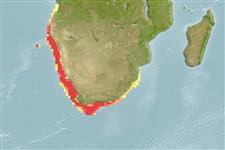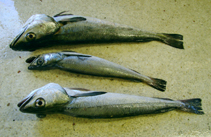Merluccius capensis Castelnau, 1861
Shallow-water Cape hake
Ajouter votre observation dans Fish Watcher
| Native range | All suitable habitat | Point map | Year 2050 |

|
| This map was computer-generated and has not yet been reviewed. |
| Merluccius capensis AquaMaps Data sources: GBIF OBIS |
Envoyez vos Photos et vidéos
Pictures | Stamps, coins, misc. | Images GoogleMerluccius capensis
Picture by Le Noury, P.
Pictures | Stamps, coins, misc. | Images GoogleMerluccius capensis
Picture by Le Noury, P.
Angola country information
Common names:
Marmota, Pescada, Pescada do reino
Occurrence: native
Salinity: marine
Abundance: | Ref:
Importance: | Ref:
Aquaculture: | Ref:
Regulations: | Ref:
Uses: no uses
Comments: Also Ref. 1371, 3650.
National Checklist:
Country Information: https://www.cia.gov/library/publications/resources/the-world-factbook/geos/ao.html
National Fisheries Authority:
Occurrences: Occurrences Point map
Main Ref: Bianchi, G., 1986
National Database:
Occurrence: native
Salinity: marine
Abundance: | Ref:
Importance: | Ref:
Aquaculture: | Ref:
Regulations: | Ref:
Uses: no uses
Comments: Also Ref. 1371, 3650.
National Checklist:
Country Information: https://www.cia.gov/library/publications/resources/the-world-factbook/geos/ao.html
National Fisheries Authority:
Occurrences: Occurrences Point map
Main Ref: Bianchi, G., 1986
National Database:
Common names from other countries
Classification / Names Noms communs | Synonymes | Catalog of Fishes(Genre, Espèce) | ITIS | CoL | WoRMS | Cloffa
> Gadiformes (Cods) > Merlucciidae (Merluccid hakes)
Etymology: Merluccius: Latin, mar, maris = the sea + Latin, lucius = pike (Ref. 45335).
More on author: Castelnau.
Etymology: Merluccius: Latin, mar, maris = the sea + Latin, lucius = pike (Ref. 45335).
More on author: Castelnau.
Environment: milieu / climate zone / depth range / distribution range Écologie
marin bathydémersal; océanodrome (Ref. 51243); profondeur 50 - 1000 m (Ref. 27121), usually 150 - 450 m (Ref. 27121). Deep-water; 11°S - 37°S, 5°E - 33°E (Ref. 58452)
Distribution Pays | Zones FAO | Écosystèmes | Occurrences | Point map | Introductions | Faunafri
Southeast Atlantic: Baie Farte, Angola around Cape to Natal, South Africa. Also found on Valdivia Bank (26°18'S, 6°20'E).
Length at first maturity / Taille / Poids / Âge
Maturity: Lm 47.4 range ? - ? cm
Max length : 140 cm TL mâle / non sexé; (Ref. 6605); common length : 50.0 cm TL mâle / non sexé; (Ref. 1371)
Max length : 140 cm TL mâle / non sexé; (Ref. 6605); common length : 50.0 cm TL mâle / non sexé; (Ref. 1371)
Description synthétique Clés d'identification | Morphologie | Morphométrie
Épines dorsales (Total) : 1; Rayons mous dorsaux (Total) : 47 - 54; Épines anales: 0; Rayons mous anaux: 37 - 41. Light brown above, silvery to white below (Ref. 6605).
Found on the continental shelf and slope to depths over 1,000 m (Ref. 27121). Juveniles (to about 64 cm) feed on small crustaceans and small deep-sea fishes such as lanternfishes, whereas larger individuals feed chiefly on small hakes and jack mackerel (Ref. 1371); cannibalism is common (Ref. 27121). Migrates southward in the spring and northward in autumn (Ref. 1371). Breeds throughout the year, peaks of reproductive activity in August and September (Ref. 36731). Marketed smoked, frozen, and fresh on ice; eaten steamed, fried and baked (Ref. 9988).
Life cycle and mating behavior Maturité | Reproduction | Frai | Œufs | Fécondité | Larves
Référence principale
Upload your references | Références | Coordinateur | Collaborateurs
Cohen, D.M., T. Inada, T. Iwamoto and N. Scialabba, 1990. FAO species catalogue. Vol. 10. Gadiform fishes of the world (Order Gadiformes). An annotated and illustrated catalogue of cods, hakes, grenadiers and other gadiform fishes known to date. FAO Fish. Synop. 125(10). Rome: FAO. 442 p. (Ref. 1371)
Statut dans la liste rouge de l'IUCN (Ref. 130435: Version 2024-1)
Préoccupation mineure (LC) ; Date assessed: 12 July 2012
Menace pour l'homme
Harmless
Utilisations par l'homme
Pêcheries: intérêt commercial mineur
FAO(pêcheries: production, Résumé espèce; publication : search) | FishSource | Sea Around Us
Plus d'informations
Trophic ecology
Éléments du régime alimentaire
Composition du régime alimentaire
Consommation alimentaire
Food rations
Prédateurs
Éléments du régime alimentaire
Composition du régime alimentaire
Consommation alimentaire
Food rations
Prédateurs
Population dynamics
Paramètres de croissance
Max. ages / sizes
Length-weight rel.
Length-length rel.
Fréquences de longueurs
Mass conversion
Recrutement
Abondance
Paramètres de croissance
Max. ages / sizes
Length-weight rel.
Length-length rel.
Fréquences de longueurs
Mass conversion
Recrutement
Abondance
Anatomy
Surface branchiale
Brain
Otolith
Surface branchiale
Brain
Otolith
Physiology
Body composition
Nutrients
Consommation d'oxygène
Type de nage
Vitesse de nage
Visual pigments
Fish sound
Diseases & Parasites
Toxicity (LC50s)
Body composition
Nutrients
Consommation d'oxygène
Type de nage
Vitesse de nage
Visual pigments
Fish sound
Diseases & Parasites
Toxicity (LC50s)
Human related
Aquaculture systems
Profils d'aquaculture
Souches
Ciguatera cases
Stamps, coins, misc.
Aquaculture systems
Profils d'aquaculture
Souches
Ciguatera cases
Stamps, coins, misc.
Outils
E-book | Guide de terrain | Clés d'identification | Générateur de fréquences de longueur | Outil de dynamique de population | Carte par point | Classification Tree
| Catch-MSY |
Articles particuliers
Télécharger en XML
Sources Internet
Aquatic Commons | BHL | Cloffa | Websites from users | FishWatcher | CISTI | Catalog of Fishes(Genre, Espèce) | DiscoverLife | ECOTOX | Faunafri | Fishtrace | GenBank(génôme, nucléotide) | GloBI | GOBASE | | Google Books | Google Scholar | Google | IGFA World Record | MitoFish | Otolith Atlas of Taiwan Fishes | PubMed | Reef Life Survey | Scirus | SeaLifeBase | Arbre de Vie | Wikipedia(aller à, chercher) | World Records Freshwater Fishing | Zoobank | Zoological Record
Estimates based on models
Preferred temperature (Ref. 115969): 7.7 - 14.4, mean 10.2 (based on 78 cells).
Phylogenetic diversity index (Ref. 82804): PD50 = 0.5000 [Uniqueness, from 0.5 = low to 2.0 = high].
Bayesian length-weight: a=0.00513 (0.00339 - 0.00775), b=3.11 (2.98 - 3.24), in cm Total Length, based on LWR estimates for this species & Genus-body shape (Ref. 93245).
Niveau trophique (Ref. 69278): 3.9 ±0.65 se; based on food items.
Résilience (Ref. 120179): Faible, temps minimum de doublement de population : 4,5 à 14 années (K=0.07-0.13).
Fishing Vulnerability (Ref. 59153): High to very high vulnerability (67 of 100).
Climate Vulnerability (Ref. 125649): Very high vulnerability (86 of 100).




